#66: At length ‘her majesty’ recovered speech and... said, with a haughty air, ‘You is no gentlemen.'
William Dorsey Swann - the first US drag queen + activist who shaped queer society
Do you think trailblazers ever wake and decide they’ll shape history?
If they do, it’s got to be the villains, like billionaires who wake up and decide to sway elections, or people who decide to commit mass murder. The quieter, or less malevolent, revolutions though? Emily Dickinson likely didn’t plan on impacting U.S. poetry for over a hundred years, and whoever wrote the Epic of Gilgamesh sure as hell didn’t plan on humanity using it as a model for contemporary storytelling thousands of years later.
And like whoever first told the story of Gilgamesh and Enkidu, sometimes an iconoclast’s contributions to the world are felt for eons, even as their name fades from popular memory. And perhaps nobody in U.S. history has been on the receiving end of that contradiction more than William Dorsey Swann: former enslaved man, D.C. cornerstone - and the first named drag queen in U.S. history.
Today we’re going to…
💌 Learn about William Dorsey Swann's first brush with the law,
💌 imagine the glory of a good turn-of-the-century drag party,
💌 and see how Swann contacted the president himself to
advocate for queer rights.📚 A childhood, a life, an opportunity
William Dorsey Swann was born into slavery in Hancock, MD around 18581, the fifth of thirteen children. After the Civil War ended in 1865, his parents bought a plot of land and started a farm, and by 1880, Swann moved to Washington, DC ~95 miles/150 kilometers away to work as a janitor and send extra money home to support his family.
Supporting your family is always tough, but with twelve siblings and two parents who had no generational capital and bought their farm on gumption alone? We may not have his diaries from the time, but there’s no doubt our friend Swann was working his ass off to help his family stay above water.
And in 1882, while working for The Washington Library Company, a rather sus opportunity presented itself. A group of petty thieves approached Swann about some books piled in a lumber room. Nobody’d miss those books, the thieves said, and anyway, they were about to be tossed out. If Swann smuggled those doomed books out instead, the thieves promised, they’d give Swann $1.75 (about $57/€52 in today’s money).
Even today, many people who who send every penny back to their families would likely jump at the chance for $57 in what seemed like a harmless crime. But almost immediately, police caught Swann, sentencing him to six months in prison.
His employers were pissed - and not at Swann2, who was a solid employee that his bosses knew worked hard. His employers, alongside the sentencing judge himself, wrote to the President of the United States to request a pardon.
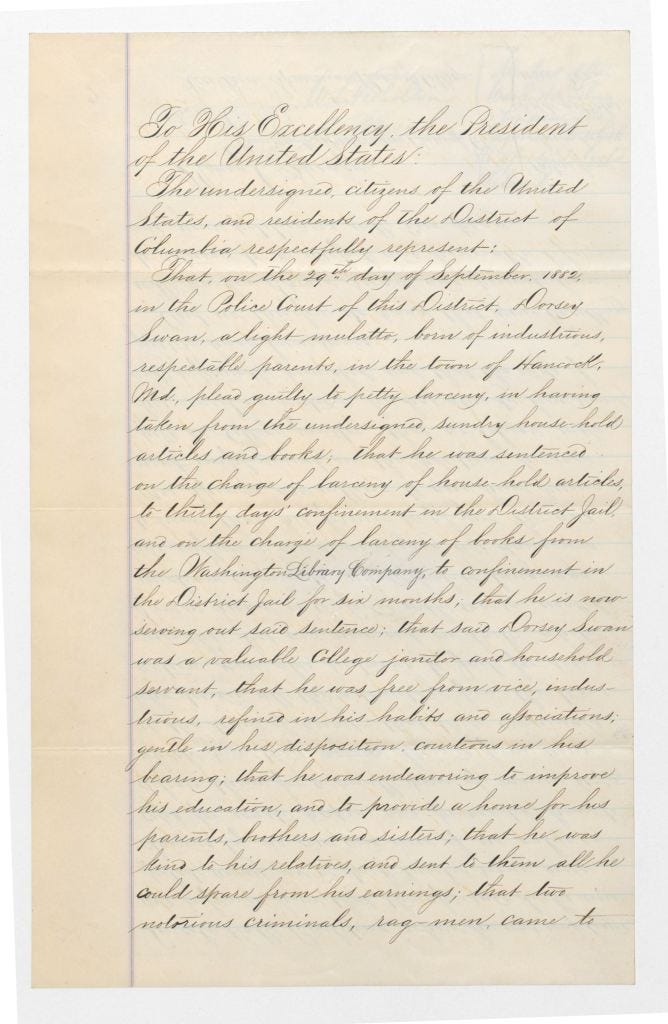
[He is] free from vice, industrious, refined in his habits, and associations, gentle in his disposition, courteous in his bearing… he was endearing to improve his education, and to provide a home for his parents, brothers, and sisters…
His employers went on to say they’d offer him permanent employment if the court let him out early. Frustratingly, there isn’t any evidence as to whether President Grover Cleveland granted this pardon - but it’s easy to imagine Cleveland wasn’t swayed, given the nature of the time.
What we do know is that afterwards, for much of the 1880s, Swann was living his best life out of prison. And as he sent money home to his blood family, Swann was discovering a second kind of family: queer community. In the name of truth and mutual support and all the goodness of self expression, Swann started hosting parties for queer men and fellow drag performers. And for a few years, it must’ve been a dream.
🍾 Host a party, break the law
Until 1888. Swann’s luck snagged on some thorns a second time when he was arrested and imprisoned for thirty days after committing the heinous crime of hosting a party in his own home3.
The arrest made front-page headlines in DC’s The National Republican. The lengthy article practically gags on its own glee as it recounts the police officers’ version of events4.
Honestly, it boggles me that the primary officer was ever seen as a hero by the public: after seeing people enter Swann’s private home, the officer felt nosy as fuck and asked to enter the neighbor’s home, climbed to said neighbor’s top floor, and watched Swann’s private party through the window before deciding to arrest Swann for hosting his birthday party in his own home.
👸🏿 Ever the queen
But the police couldn’t rob Swann of his integrity and poise. Even the article’s author can’t help but paint a regal picture of Swann in The Queen persona:
The queen stood in an attitude of royal defiance. Her arm hung by her side. On her head was a black wig. The long white-buttoned kid glove reached up almost to the shoulders and the… queen seemed bursting with rage. The ten-foot trail to her low-cut and short-sleeved white silk dress, with the lace overdress, stood out its full length, and appeared spread for a full reception, but different from that met with. At length ‘her majesty’ recovered speech and, advancing her right foot, which was encased in a gold-embroidered black slipper, she said, with a haughty air, ‘You is no gentlemen.'
While the writer afterwards is nearly giddy recounting the officers physically assaulting Swann, ruining his birthday party and confiscating the nice food and whiskey laid out, there is no denying the almost awed recollection of Swann’s power.
The jail stint was brief. Thirty days later, Swann was released, and, resilient as ever, went right back to hosting his parties and celebrating queer and Black joy. A quiet eight years passed and I like to imagine it filled with beautiful gowns, inside jokes, dancing - a rich world of people just being people. Picture it, not as a black-and-white snapshot, but a breathing, living party, one where someone probably spilled wine on their dress and another person helped them lift the stain. Or maybe a performer’s dress train tore mid-dance and he cried in the bathroom. People probably fell in love, best friends rested their heads on each others’ shoulders, and folks laughed so hard they snorted, or ate so much their bellies ached and they had to fight the urge to enter a food coma instead of dancing. In short, normal, beautiful, all-too-human things in private parties for free expression.

For eight years, Swann enjoyed that lush circle of friends and trust, and I’m sure that thirty-day stint in prison eventually felt like it happened to someone else entirely.
🎉 A New Year, a new raid
But on New Year’s Eve 1895, right as his holiday party was kicking off, Swann’s peace came tumbling down once more5.
William Dorsey Swann… lives at No. 1504 L Street northwest, and last night the police suspected that he was going to give a “drag” for the benefit of his white friends. Such a gathering has not been raided for several years, and the police had no idea of the character of the white men whom they were going to find in the place. About midnight Sergt. Jordan got together a squad of officers and went to the house… only to find that they were a little too early, for the gathering was not in full blast.
Four colored men and three white men were found in the house, and Swann was placed under arrest on a charge of keeping a disorderly house. William Alfred, the cook, who wore a long gown, and James Frazier, a member of the entertaining party, were arrested as vagrants, while the white men were summoned as witnesses6.
Swann had made elaborate preparations for the entertainment of his guests, and the police took charge of the liquid refreshments which included beer, wines of various kinds and the most expensive champagne. These liquids were in court today as evidence in the case. A jury trial was demanded in Swann’s case, and the colored trio will be tried next week7.
If we can find one silver lining, it is that the stupid police arrived too early, meaning countless others escaped arrest for something as awful as celebrating New Year’s Eve.
Back then, a “disorderly house” was a euphemism for running a brothel - which Swann was not doing. But this false equivalency of queerness and perversion has deep roots in the USA, something drag bans today reflect, as Representative Zephyr eloquently expressed when appealing to her fellow council members in Montana last week.
And make no mistake: hatred for queer people was the centerpiece of the judge’s sentencing8.
William Dorsey Swann the colored man… whose “drag” was raided about two weeks ago… was sentenced to ten months in jail by Judge Miller. This is the case in which a number of men, white and colored, were found in this place, which Judge Miller characterized as a “hell of iniquity.”
…In disposing of the case Judge Miller told of the… downfall and ruin of young men, and said he only wished he had power to impose a ten years’ sentence.
“I would like to send you where you would never again see a man’s face,” said the judge, “and then would like to rid the city of all other disreputable persons of the same kind. Thieving and petty assaults amount to nothing as compared with the conduct of these people.”
The judge’s motives for sentencing firmly place this as a case of discriminating against Swann for his gender expression - and it’s that exact fact that makes Swann and his community’s next moves so groundbreaking.
Three months into his prison sentence, Swann started having health problems. Instead of sitting there and facing punishment for crimes he didn’t commit, Swann and his community rallied, taking the issue straight to the top and writing to the President of the United States, Grover Cleveland, requesting a pardon.
To His Excellency
The President of the United States,
The petition of William Dorsey Swann, respectfully represents:
… That [the] petitioner earnestly prays that a pardon may be granted for the following reasons:
1st. Because he has always been a hard working, and industrious man, as is best evidenced by the fact of his continuous employment by General Dudley, one of the well-known citizens of the District of Columbia.
2nd. Because of the unusual severity of the sentence imposed in the petitioner’s case.
3rd. Because if pardoned he will hereafter live a proper and law-abiding life; whereby he prays that executive clemency may be extended to him and in duty bound he will ever pray &c.
Thirty people signed the letter, most of whom were likely fellow members of the drag and queer community.
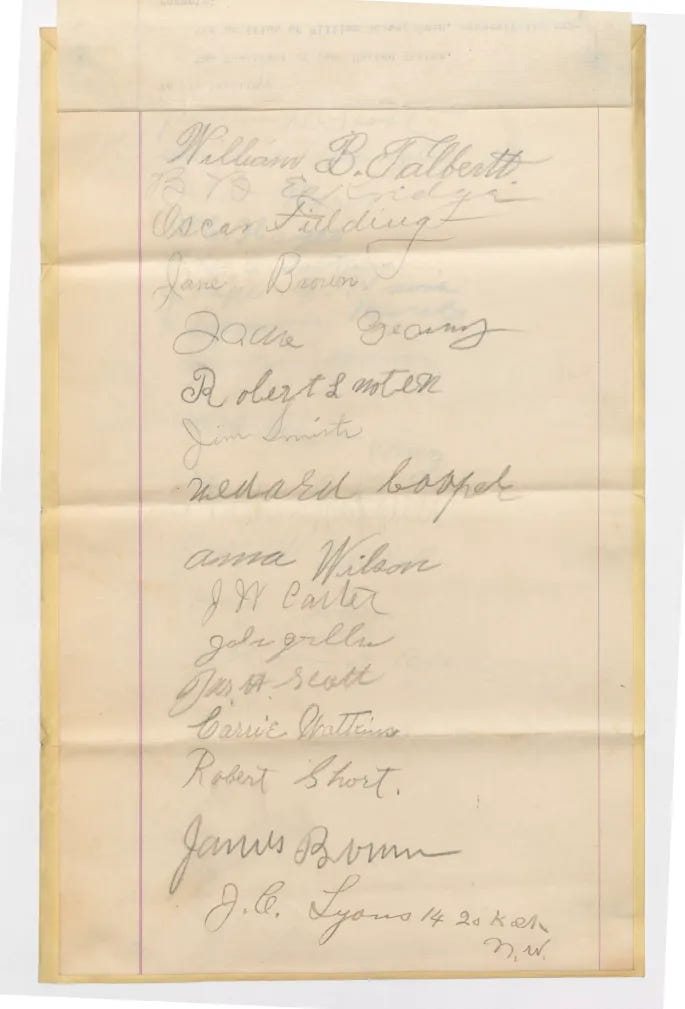
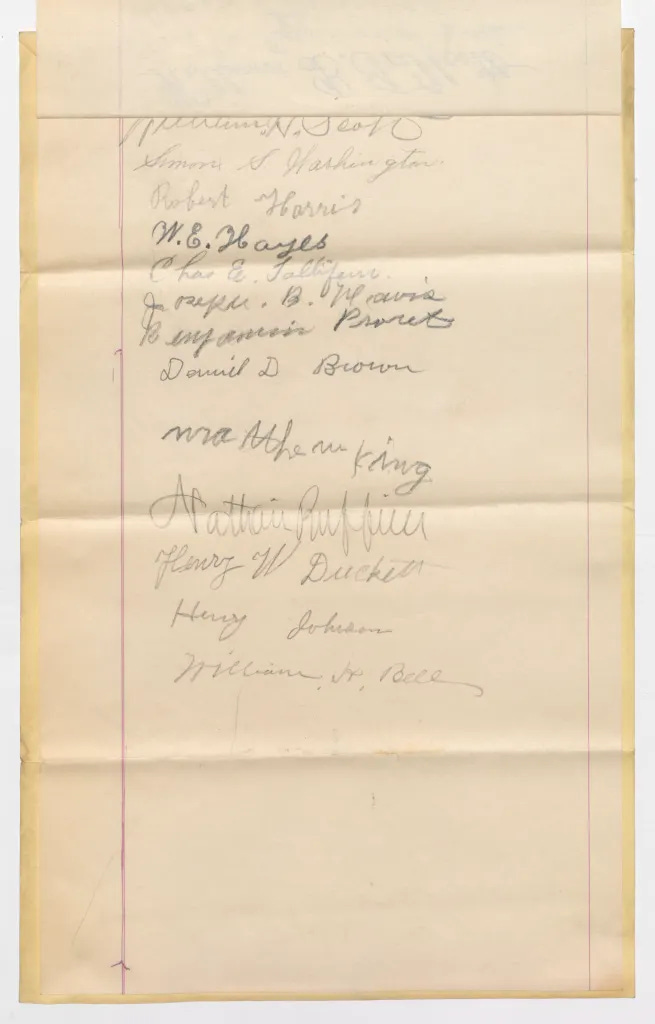
This is the first documented case in US history where the queer community legally advocated for their right to gather, pushing against laws barring them from socializing safely in groups.
A reply took months and Swann’s health worsened. His friends and advocates contacted the US Attorney’s Office9 multiple times, expressing concern.
And finally, on July 29, 1896, Grover Cleveland deigned reply10.
Denied. Cleveland’s handwriting is basically illegible11, but he does say that his health issues aren’t enough “in my opinion to justify” his pardon in light of “the character of his offense.” Cleveland signed only his initials at the end.
Thankfully, Swann survived, but after that, public mentions of him largely disappear. After ten months in prison, his zest for drag parties understandably dimmed, and by 1900, he’d retired from public drag circles entirely. In 1925, he passed away. But the family name endured: Swann’s younger brother Daniel made dresses for the drag community until his own death in the 1950s12.
Even though his drag days are now over a hundred years behind us, the legacy of Swann’s exuberance and bravery in the face of racial, gender, and sexual oppression lives on to this day.
And if we can take a note in these dark days, months, years ahead, it’s that there’s nothing more powerful, noteworthy, and profoundly irritating to the homophobes and racists out there than when we spark our protest fires with joy and joy and joy and joy.
All my untamed love and stamps forever,
Nikita, your Snail Mail Sweetheart
Additional sources:
This article from the Fashion Conservatory - I wasn’t expecting it to be so thorough, but it was!
This TED Talk on William Dorsey Swann
And:
“The First Self-Proclaimed Drag Queen was a Formerly Enslaved Man” by Kari Shane for Smithsonian Mag, June 9, 2023
Maybe those books really were destined for the ole garbage heap.
It’s rather long so I’ve only included an excerpt, but you can (and should!) read the whole thing here.
Will every single post of mine holler about the democratic importance of primary sources, like the digital archives of US newspapers from the 1700s to the mid 1900s publicly available thanks to the Library of Congress? So long as the mess that is the United States continues, yes. Yes, it will.
Notice how the three white guys remain anonymous, while the Black men are outed, Dorsey Swann’s address being made public?
William Dorsey, the Queen of Drag: Rediscovering Black History via the National Archives, 2020
Responses pulled from The National Archives catalog
Can you read the whole thing? Leave what he said in the comments!
“William Dorsey Swann - Oxford African American Studies Center” by noted scholar of Black LGBTQ+ history Channing G Joseph









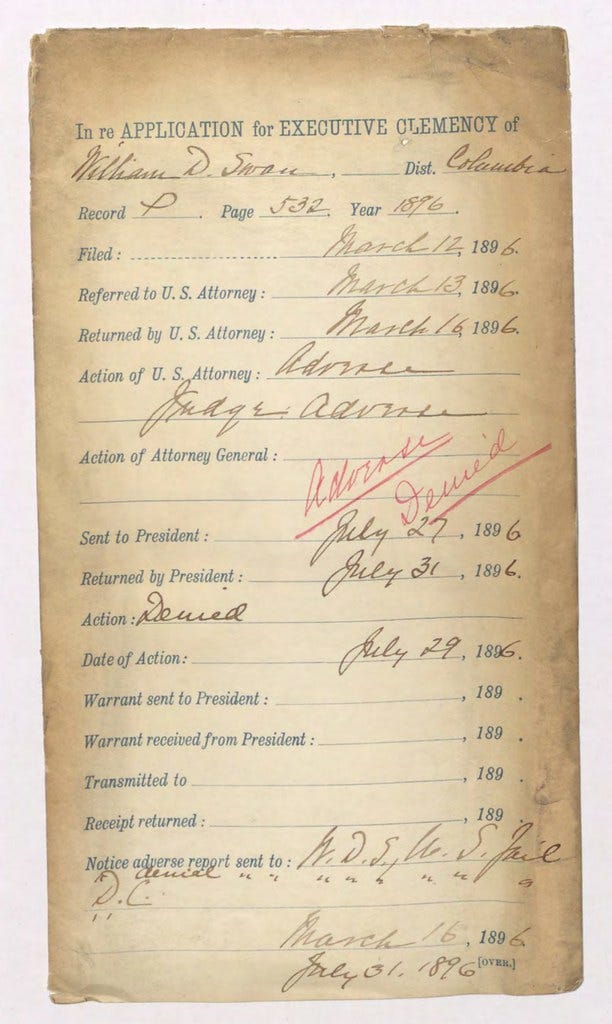
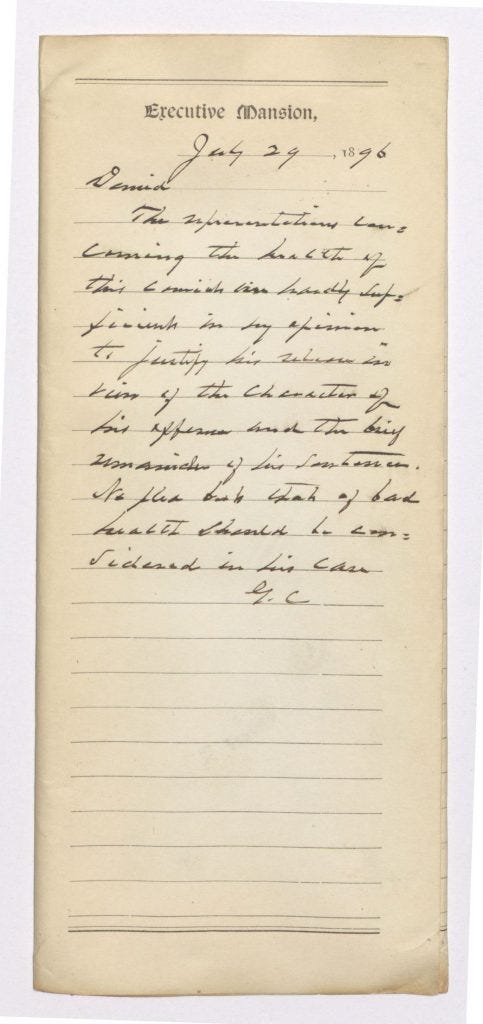

Thank you for this interesting and informative story. I doubt that I will soon forget William Dorsey Swann as I now associate him with Swanns Way. I reflexively like any article that mentions The Epic of Gilgamesh. Please give a shout out to Enheduanna sometime.